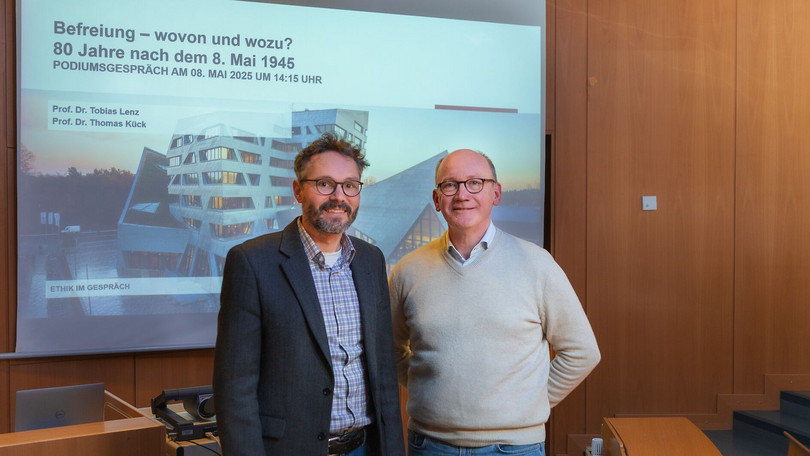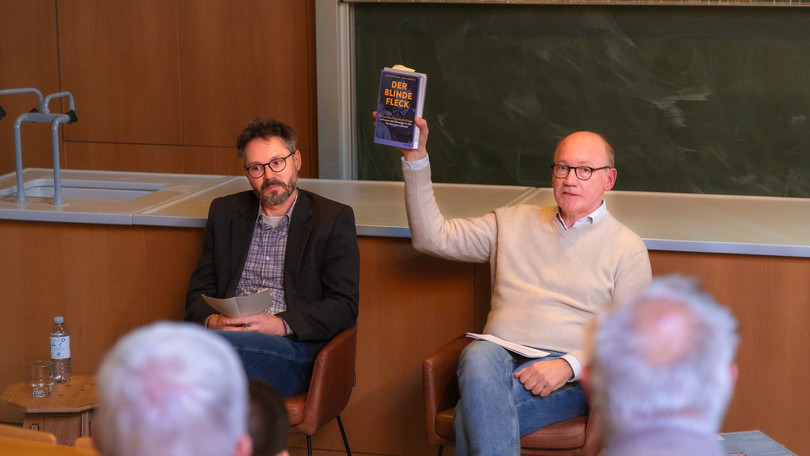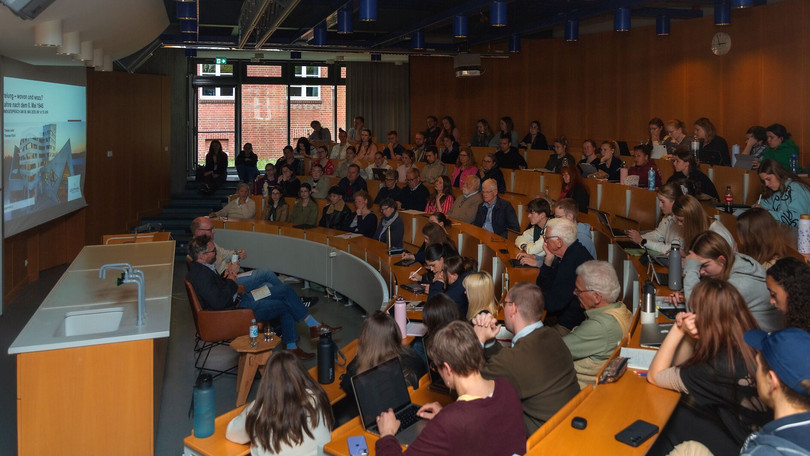“The Germans have been liberated from themselves” - A plea for European integration, the strengthening of international law, and Israel's right to exist
“Ethics in Conversation” – Discussion about May 8 and the concept of liberation
2025-05-14 “May 8, 1945, was not only a day of defeat, but also a day of liberation.” With this sentence, then-German President Richard von Weizsäcker shaped the culture of remembrance in Germany. When he said this, the war and Nazi tyranny had been over for 40 years. Another 40 years have passed since then. Germany and Europe are commemorating the end of the war 80 years ago. The event series ETHIK IM GESPRÄCH (Ethics in Conversation) at Leuphana University Lüneburg has taken up this topic. On May 8, political scientist Prof. Dr. Tobias Lenz and theologian Prof. Dr. Thomas Kück discussed the end of war and Nazi rule as a liberation. But: From what were the Germans liberated, and to what end? Interest was high. Lecture Hall 5 was filled to capacity with students and prominent figures from the city.
According to a survey conducted by ZEIT on March 27, more than half of the German population would like to see an end to debates about the past, especially since, in the opinion of a majority of those surveyed, there were only a few Nazi criminals and the majority were not guilty anyway. “So draw a line under it because most people were innocent – if that were the case, what were the Germans liberated from?” Thomas Kück provocatively entered the discussion. At the same time, he questioned whether it was even possible to speak of a liberation of Germany as a whole, given the different historical developments in East and West Germany. “The countless women in East Germany certainly did not experience the barbaric violence they suffered as liberation.”
Tobias Lenz took the view that Germany was indeed liberated from fascism on May 8, 1945, with the end of the war and in the years that followed, not by itself, but by the Allies. “But that was not the end of the story. In fact, it was only the beginning, and it has turned out to be a success story, especially from a German perspective.” At the same time, he emphasized that the world had also been liberated from Germany at that time, namely from a megalomania that had persisted since the German Empire. “Today, Germany is expected to play a greater role internationally, including militarily. That is paradoxical compared to the end of the war.” The quest for supremacy in Europe was thwarted by liberation from Nazi rule and Germany's integration into European structures, which at the same time enabled the development of democracy. This resulted in a threefold responsibility for Germany in the world: “On the one hand, there is responsibility for European integration, on the other hand, there is a commitment to international law, and finally, there is the defense of Israel's right to exist.”
Thomas Kück agreed with this thesis, especially with regard to defending Israel's right to exist, however difficult this position may be in the current situation. He supplemented the political external perspective with a psychoanalytical internal view: “The Germans have, first and foremost, been liberated from themselves, from the demonic evil that they were capable of under the conditions of dictatorship.” In doing so, he addressed the profound and subtle entanglements of countless people in the Nazi system. Referring to the book “Der blinde Fleck” (The Blind Spot) by Stefan Lebert and Louis Lewitan, he discussed inherited traumas and their repression, which are now coming to light in the grandchild and great-grandchild generations. Kück emphasized this point further with the thesis: “The Germans have been liberated to themselves so that they can contribute to a life of greater justice, peace, and freedom under the possibilities of democracy.”
The lively discussion with the audience that followed focused on the fact that liberation in the context of war was also a violent act, an event that many could not understand as liberation, especially in East Germany. Here, the perspective should not be solely Western. At the same time, however, May 8, 1945, can be understood as the beginning of a long process of liberation. Another central theme was the question of the current responsibility of the student generation. “The first responsibility we bear is that of remembrance, individually but also collectively. This gives rise to a certain modesty and a desire to balance interests,” said the political scientist at the end of the discussion.



